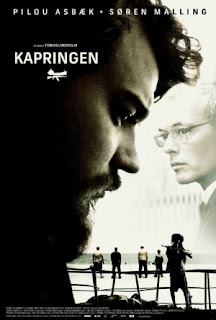A Hijacking [Kapringen] (Denmark, 2012); Dir. Tobias Lindholm)
Commercial shipping is for most people an unknown behemoth, out of sight and out of mind, despite its intrinsic role in global trade. It’s due in no small part to the maritime industry’s exceptionally high safety standards; as with aviation major incidents are relatively few and far between.
For another industry, one geared towards more vicarious pleasures, such benign subject matter usually doesn’t hold much appeal.
That was until 2009 when an American ship, the Maersk Alabama, was hijacked off the coast of Somalia, bringing the issue of modern-day piracy into public consciousness. The story of that incident is due to be recounted in Paul Greengrass’s forthcoming Captain Phillips later this year, with Tom Hanks in the eponymous role.
 Before that there's Tobias Lindholm’s A Hijacking, a modest yet thoughtful Danish production which largely eschews action for a claustrophobic psychological drama. If you’re drawn into imagining scenes of trapped, desperate men uncertain of their fates who slowly forge bonds with their captors that’s really only half the story.
Before that there's Tobias Lindholm’s A Hijacking, a modest yet thoughtful Danish production which largely eschews action for a claustrophobic psychological drama. If you’re drawn into imagining scenes of trapped, desperate men uncertain of their fates who slowly forge bonds with their captors that’s really only half the story.
Mikkel (Pilou Asbæk), is a young cook onboard the MV Rozen, a Danish merchant ship in the Indian Ocean, looking forward - with predictable and caustic irony - to being reunited with his family at the end of the voyage. One can reasonably infer from the outset that Mikkel, a simple unheroic man, is not going to turn out to be an undercover special forces op like Steven Seagal’s character in Under Siege. It's not that kind of movie. In the space of a few brief scenes Lindholm deftly applies his verite style to conveying the cramped, mundane yet tranquil life on the vessel.
Switching to the plush headquarters of the Danish shipping company that owns the vessel, we’re introduced to its ice cool CEO Peter C. Ludvigsen (Søren Malling, like Asbæk he'll be familiar to some from tv drama Borgen). It's apparent from Ludvigsen's hard line during negotiations with Japanese business partners that he's a man used to being in control, so the sudden news of the Rozen's seizure by pirate presents him with a new and formidable challenge.
The decision to omit the crucial scenes of the ship's assault and capture, a result one suspects as much from financial necessity, is likely to leave some viewers feeling cheated but it’s just the first of many ellipses. When focus shifts back to the vessel the Somalis have firmly established control, locking up Mikkel and some other members of the crew; leaving the fate of others a long-unresolved mystery. We’re introduced to Omar, an English speaking Somalian himself kidnapped (or so he claims) for the purpose of acting as translator and negotiator.
One striking facet to the drama is just how measured and businesslike is the response of Ludvigsen and his company to the situation back in Denmark. It’s testament to the film’s adherence to verisimilitude that there’s no “we don’t negotiate with terrorists” hyperbole here, or even any great sense of urgency. Rather it’s a case of driving down the pirates’ demands to what constitutes acceptable losses to the business, be it human or financial. Thus begins a series of satellite phone conversations between Ludvigsen and Omar, curious in both their brevity and stilted civility.
Tension builds slowly over days, and eventually months, that follow, with Mikkel’s trauma mirrored by Ludvigsen, in his way every bit as much a prisoner. When a solution comes it’s with a bitter coda that only serves to remind how high the stakes are in such situations.
Although a fictional tale Lindholm's commitment to realism ensures a far more credible hostage drama than most. The Rozen, hired specifically for filming, had itself been the subject of a hijacking in 2007, while some of the sailors employed to play the crew had experience of hijacking in a separate incident. Elsewhere one of the key onshore roles was played by non-actor Gary Skjoldmose-Porter, a security expert with Clipper Group who seamlessly interacts with the professional players.
Yet the starkness of Lindholm's approach is both refreshing and unsettling. We are caught in the No Man's Land between two paradigms: the human and the corporate. The deeper social repercussions concerning corporate responsibility and the underlying causes of Somali piracy aren't explored, which is both frustrating and strangely admirable. Perhaps that's also an uncomfortable truth about our utilitarian age.



Comments
Post a Comment